Keir Starmer in UNISON Centre. Image: Marcus Rose
With a fourth successive election defeat – the latest being the worst of the quartet – and with the knowledge that another defeat in five years would mark the longest time that the Labour Party has ever been out of power, it’s hardly surprising if anyone wanting to see a Labour government is still reeling from December’s general election.
But politics and government don’t stop – and the party has to find a way to move forward and become relevant once again to a majority of working people.
So here we are, in late January and in the middle of yet another election campaign – this one for the leadership of the party. Meeting earlier in January, UNISON’s national Labour Link committee endorsed Keir Starmer for the job.
A day later, he visited UNISON Centre to thank members and staff and to say how he wants to walk “hand in hand” with trade unions. He’s been back several times since, partly as a way of demonstrating that desire to be part of a united movement.
“Having trade union support in this leadership campaign is hugely important to me. This is a statement of intent. This is how I want to work in this campaign and as leader of the Labour Party at all times,” he explains. “Not just at general elections, not just when we want some funding, but actually on policy issues, on campaigns.”
There have been suggestions that he’s too white, too male, too middle-class and (whisper it) a Londoner to boot, while some seem unaware of the role he’s played in the British labour movement for a long time.

Meeting staff at UNISON Centre. Image: Amanda Kendal
Named after Labour Party founder Keir Hardie, no less, Keir Starmer grew up in Surrey in a family of four children, with a dad who worked in a factory as a toolmaker and a mum who was a nurse. His mum had Still’s disease, a very rare disease where your immune system turns on itself.
“As I was growing up, we as a family spent a lot of time in high-dependency units with my mum in a very bad way,” he says now. “That shaped some of what came next in the sense of a determination that things should be different – and better.”
Having joined the Labour Party at 16, he chose a legal route to make things better because “I saw the ability through the law to deal with injustice”.
So after school, he became the first of his family to go to university, heading to Leeds to begin his studies. From his appointment as a barrister in 1987 through his five years as Director of Public Prosecutions to his time as an MP, injustice has always been in his sights.
Campaigning lawyer
“I started my legal career doing housing cases, employment cases – I’ve probably done three or four hundred trade union cases, including for UNISON.
“One of the very first cases I ever did was on behalf of the NUM to challenge the pit closure programme that Heseltine [the then secretary of state for trade and industry under Margaret Thatcher] put in place.”
He was also involved in helping families of strikers at the P&O dispute in Dover and with the print unions at Wapping.
There was free help in the ‘McLibel’ case, where he helped defend Helen Steel and David Morris against McDonalds, and also in advice for Poll Tax protestors.
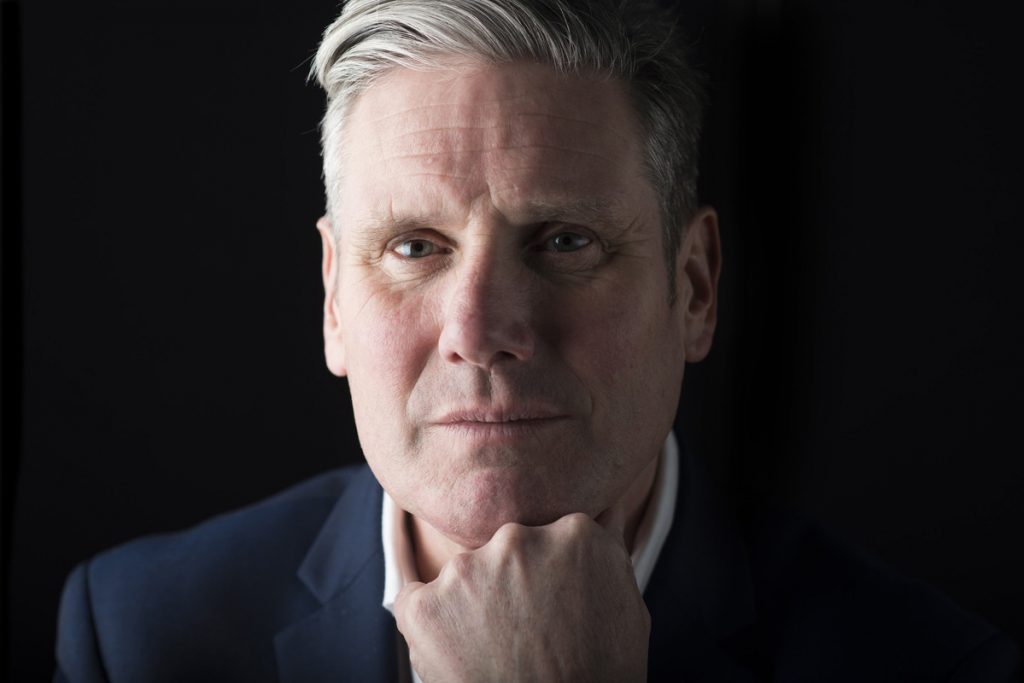
Image: Marcus Rose
Keir was also crucial in ensuring the successful prosecution of two of the murderers of Stephen Lawrence. Stephen’s mother, Doreen, is supporting him in his bid to become the Labour leader.
There has been international human rights work too, including tackling the colonial legacy of the death penalty in the Caribbean and parts of Africa, before going to Northern Ireland to work with the policing board on some of the Good Friday proposals – to turn the Royal Ulster Constabulary into the Police Service of Northern Ireland, one of the big changes that was necessary for the Good Friday Agreement.
The list goes on. He marched against the war in Iraq and publicly stated that it would be an illegal conflict. As an MP, he’s been backing the campaign for justice for the Shrewsbury 24 – and that’s why one of the construction workers imprisoned then, Royle Family star Ricky Tomlinson, is backing Keir now.
Defending the Labour legacy
“Over the last few years – particularly since 2010 – my strong sense was that our public services were being destroyed by the Tories. Ten years of cuts have decimated our public services.
“I wanted to get into politics because we were ripping up large parts of what the Attlee government had laid down and I felt that Thatcher had destroyed our industrial base and now Cameron, May and Johnson are destroying our public sector and we need to do something about it.”
Noting that “people in the public sector are not just in a job because they want to earn a living – they’re in it because they want to provide a public service”, he adds that it’s high time that they are properly recognised for that and get the pay they deserve. Indeed, the manifesto commitment on public service pay is one of the strands he would personally have kept in a slimmed-down version.
Having defended environmental campaigners over the decades, Keir is clear that “the work that the Labour Party has done on the green New Deal needs to be preserved and carried forward.
“And the argument that something’s good if it’s good for the economy but bad for the environment has got to go. If it’s bad for the environment, then it’s bad for the economy.”
But after Chancellor Sajid Javid stated that there would be no alignment of regulations after Brexit, there are fears for what that will mean for many areas, including the environment – especially in terms of a trade deal with Donald Trump’s US.
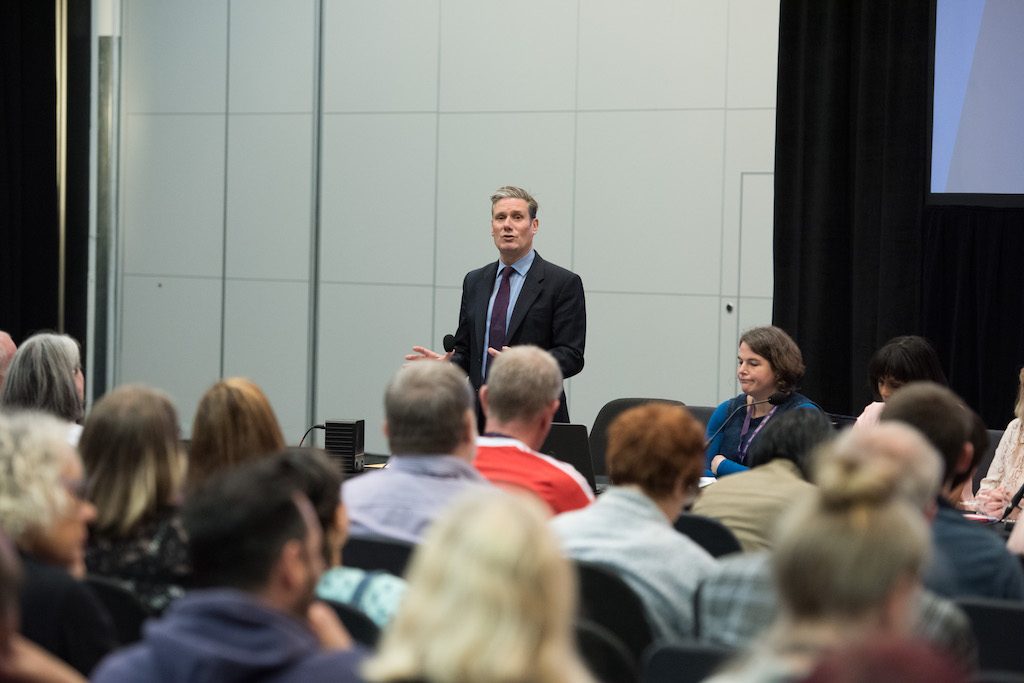
Brexit fringe at UNISON’s 2019 national delegate conference. Image: Marcus Rose
Ah yes: the ‘B’ word. As shadow secretary of state for exiting the European Union, Keir has had a difficult path to tread.
“Now though, we have to recognise that we’re leaving the EU and the argument about whether you’re for remain or leave is over. We will have left.
“But that doesn’t mean that the fight to protect workplace rights, environmental standards and consumer protections isn’t as important now as it ever was.
“We need to make sure that we’re challenging Boris Johnson and his government all the time on the damage that his deal will do – not just to the economy, but to working people, to trade unions and environmental and consumer standards. That’s what I mean by effective opposition.”
This leadership election comes as the party and supporters are still trying to understand the defeat and its scale.
There are “a number of reasons that we lost this election,” says Keir. “The four things that came up on the doorsteps, more than anything else, were the leadership of the Labour Party, Brexit, the overloaded manifesto – as people saw it – and anti-Semitism.
“Fairly or unfairly, we also faced a hostile media and Jeremy Corbyn in particular was vilified by the media.
“Collectively, I think we lost the trust of the public in the Labour Party, as a force for good and a force for change.”
He’s clear about the challenge ahead.
“I didn’t hear people around the country say: ‘I don’t want things to change’. Almost everybody said: ‘I do want things to change!’ Public services being decimated, the health service isn’t what it should be, mental health provision isn’t there, homeless is a moral disgrace … people wanted change, but they just didn’t trust the Labour Party as the vehicle for change.
“The single most important thing between now and the next general election is to restore that trust in the Labour Party as a force for good and a force for change.”
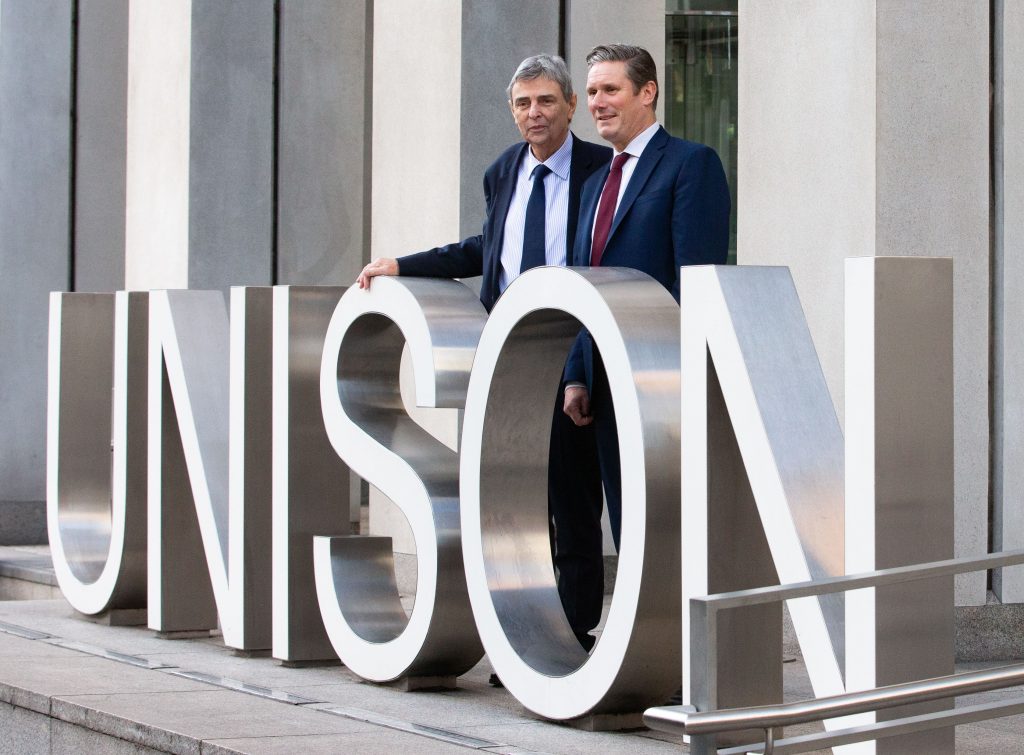
With UNISON general secretary Dave Prentis outside Unison Centre. Image: Mark Thomas
But that doesn’t mean changing principles. “It doesn’t mean that we shouldn’t be radical,” Keir says.
“It doesn’t mean that we don’t have to do some pretty fundamental shifting of power and wealth – but it does mean that we have to be relevant and credible so that people feel that they can vote for the Labour Party, confident in the knowledge that it can bring about the change that matters to them.”
He’s clear too that, “going across the country, people want to know: ‘what have you got to say? Are you listening to us?’ – not ‘where are you from?’
“And we need to win back seats in the Midlands and the North West and the North East that we’ve just lost, but if all we do is win those seats back, we’ll still lose the next general election.
“We need to win back seats in Scotland, we need to win seats in Wales and, if you draw a line from London to Bristol and look south, there are 120 seats and we need to win in the south west and south east and south as well.
“So actually, the leader of the Labour Party needs to speak for the whole of England, the whole of Scotland, the whole of Wales and the whole of Northern Ireland.”
Looking forward
The primary task is to unify the party, he says, noting that members and supporters are fed up with factionalism. It’s true that divided parties don’t win elections. “We’ve got to be a very effective opposition to Boris Johnson – by far the most dangerous prime minister since I’ve come into politics – and we need to forge a path to victory at the next general election.
“I think, with the right team around me, I can do that and it’s one of the reasons I was proud and privileged and honoured to have got UNISON’s support, which demonstrates how the Labour Party and trade unions and can work together – not just in the campaign for leadership, but in everything that comes after.
“We are not going to win votes easily in Parliament, but we can absolutely show the country that we have the right arguments if we’ve got our most powerful advocates at the Despatch Box and also making the arguments across the country, in our communities, in every nation and every region.”
The ballot for the Labour Party leadership elections opens on Monday 24 February

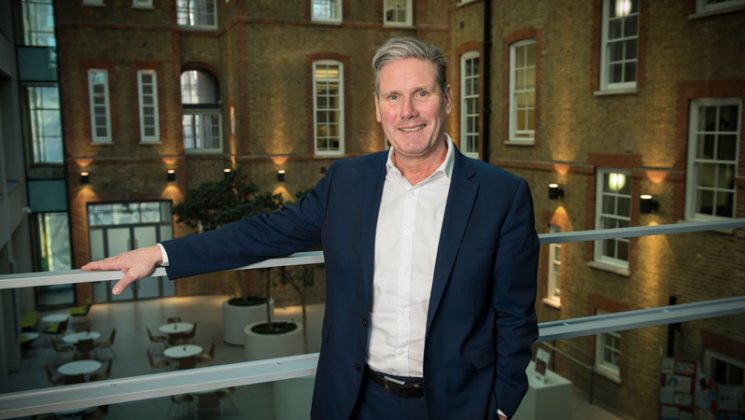
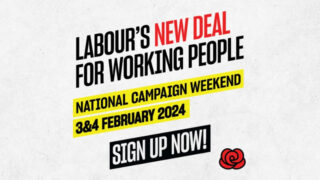

Two very good articles that should be read by everyone, if only to counteract the lies being published against Keir. In October , I shall have been an active member of the Labour Party for 70 years and I can think of no two people who would make better leaders of the Labour Party and the country than these two. Keir’s background is inspirational and I’ve always believed Angela to be Jeremy Corbyn’s best appointment. Thank you Unison. I’m now going to share with all my FB friends
Keir Stammer is the best man to lead the Labour Party because of numerous reasons :
* he qualifies as a lawyer.
* he has the experience of leadership for many years at high level.
* he has the skill to rebut arguments in any given debate .
* he is at the fore front of the shadow Labour cabinent .
* he has made big contribution in policy making of the party.
* he also enjoys the majority support of the labour members.
his leadership for motivation to everyone